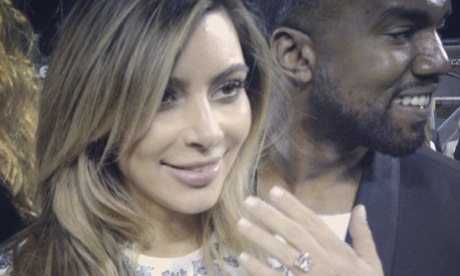当前位置: Language Tips> 双语新闻
A man's perspective on why engagement rings are a joke

|
Most of us are adult enough to know magic doesn't exist. And yet we're the same species that thinks fat rings are fairy-tale items which somehow "secure" another person's love, one step away from a "happily ever after". They're expensive, useless and, worse, are insulting to notions of actual love. As anyone who's been in a serious long-term relationship knows, you don't need geology to proclaim (let alone justify) said love. Before you take me for a cheapskate who just doesn't want to spend the money on a ring, let me explain a bit more. Many of us, especially men, have strapped our feet to the commercialised notions of what constitutesrelationships. We've turned into zombies, hungry for all things red and supposedly lovey dovey. We buy into the baffling displays of romance like the nauseating crimson heart-shaped horror show we call Valentine's Day. Or the flowers and boxed chocolates we're supposed to deliver on anniversaries to celebrate monogamous tolerance and the disbelief you haven't murdered each other. We speed through our finances and morals, enjoying the exhilaration of fitting in to societal expectation, as opposed to reflecting on whether our actions are warranted or justified. And our partners seem all too ready to go along with it. Engagement rings – specifically expensive diamond ones – are often prime examples of this unthinking mindset. The problem isn't the rings themselves, but the justifications – or the lack of justifications – behind their acquisition. We mustn't confuse engagement rings – given, usually to a woman, when a proposal is accepted – and wedding rings – given on wedding day. (Already, we should recognise how strange it is to need two different kinds of rings.) Whatever the long history of engagement items – I've heard claims of it dating from ancient Egypt or Rome, for example – the focus on engagement rings should really start with De Beers, in the 20th century. After large diamond mines were discovered here in South Africa around 1870, the mines' major investors amalgamated their interests to form De Beers Consolidates Mines. They recognised that due to diamonds having little intrinsic value, they would need to create demand via (the illusion of) scarcity and pretend worth. So began one of the most successful marketing and public manipulation campaigns of the 20th century, originating from four words: "A diamond is forever". By convincing men their love for their future wife is directly proportional to the expense of the diamond ring, and convincing women to expect love in the form of shiny stone, De Beers and their marketers, NW Ayer, began a tradition so embedded we forget it's a marketing ploy. Genius marketing, to be sure, but marketing nonetheless. And guess what? The prices keep going up, as if we are really loving more and deeper these days. According to the XO Group Inc 2011 Engagement Engagement & Jewelry survey, the average engagement ring cost $5,200. If you think that's bad, consider that nearly 12% of US couples spend more than $8,000 for an engagement ring. Of course, we should take such stats with some measure of scepticism, as Will Oremus highlights. Nonetheless, these are the prices at a time when the average American family earns less than it did in 1989. The American bias of these stats shouldn't negate the overall point: diamonds – and therefore diamond rings – are expensive and the demand was created artificially for an item that's only property here is shininess (it decreases in value as soon as you walk out the store). Any remotely logical person can see that spending several thousand on actually important items for a new couple like a place to live or putting money in an investment account will serve them far better in the future (and likely help with romantic and/or wedded bliss). That engagement ring purchases tend to be for women – not by women – is also insulting to the cause of not viewing women as objects to be acquired. Consider that this is worthy of a headline in a respected US magazine at the beginning of this month: "Women Now Paying for Their Own Engagement Rings". Many people will say that engagement rings are symbolic of love and devotion. Ignoring that this idea is itself manufactured by the profiting businesses, it also gives an arbitrary definition of "symbol": why can't a beautiful home be a symbol? Why can't long-term investments be a symbol? Indeed, would it not be more impressive to show off a house than a finger rock? Tradition is another assertion when discussing almost anything to do withmonogamy and marriage. But, like nature, tradition is a description not moral justification. Just because we've always done a particular action, doesn't mean it's always (or ever was) justified. Pointing to tradition means pointing to the mistreatment of different races and sexes, human sacrifices, and so on. Longevity, too, doesn't give moral immunity, or automatic goodness, to anything. Engagement rings aren't even used to show one is married: they're used before the wedding even occurs. Indeed, even helping avoid awkward social encounters isn't aided, since there are other (and cheaper) ways of showing you're "in a relatinship" (not to mention just telling people trying to hit on you). If you need a ring to prove your love, it's not your lack of a ring that's the problem. |
我们中的大多数都已经足够成熟,知道这个世界上并不存在什么魔法。我们同样也都知道用一颗大钻戒去“套住”一个人的心,然后“永远幸福地生活在一起”是只是童话中才会出现的故事。 戒指又贵又没用,更糟糕的是,它们还侮辱了爱情的真谛。任何一个认真处在长久恋爱关系的人都知道,你并不需要通过地里埋藏的东西来宣告(甚至刻意证明)你的爱。 在我被你们视为不愿花钱买戒指的吝啬鬼之前,请允许我多做一些解释。我们很多人,尤其是男人,已经被束缚在商业化概念构成的情感之中。我们变得像僵尸一样,渴望一切红色的东西和所谓的情爱缠绵。我们相信那些莫名其妙的浪漫表达方式,比如满眼红到令人作呕的恐怖心形物(我们称之为情人节),或者是我们应该在周年纪念日那天送上鲜花和盒装巧克力,以庆祝我们竟能在一夫一妻制下相互容忍而没有相互残杀。
有传言称订婚习俗起源于古埃及或古罗马,但不管订婚习俗的历史有多么悠久,我真正听说订婚戒指这件事应该是从20世纪的戴比尔斯公司(De Beers)开始的。 1870年左右,在南非发现一些大钻矿之后,这些矿的主要投资者们便达成了利益联合,成立了戴比尔斯联合矿业。他们知道钻石本身并没有什么价值,但他们需要利用钻石稀缺的假象来创造需求,假装它们很有价值。所以“钻石恒久远,一颗永流传”这句广告语便成为了20世纪最成功的营销和公关案例之一。 猜猜接下来怎样了?钻石的价格持续增长,时至今日,我们对它们的爱更是有增无减。根据XO集团有限公司(XO Group Inc)的2011年度订婚首饰调查,人们在订婚戒指上的平均花费约为5200美金。如果你觉得这已经是非常可怕的数字了,那么再想想,其实还有近12%的美国夫妻会花8000美金以上去买订婚戒指。当然,正如作家欧蕾慕斯(Will Oremus)所强调的,我们应该带着怀疑的态度去看这些数据。这些价格都是1989年的调查结果,而在那个年代,美国家庭平均赚到的美金其实都达不到这些数字。 尽管钻戒花费的可信度有待商榷,但这不能掩盖这个事实:钻石以及钻戒的天价都是人为创造出来的,它们唯一的特性就是闪亮(但一旦走出商场,闪亮的它们就会黯淡下来)。 任何一个有长远思维的人都会发现,对新婚夫妇来说,花数千块钱在一些住房或是投资理财之类真正重要的事情上对他们的将来可能会更有意义(也可能有助于营造浪漫和提高婚姻幸福感)。 订婚戒指是买给女人的,而不是被女人买的,这种不将女人视为购买戒指的对象也是对女性的一种侮辱。想像一下,如果本月初在一个权威的美国杂志上看到这样一条新闻:“女人为自己购买订婚戒指”,那么它一定可以成为新闻头条。 很多人会说,订婚戒指是爱情和忠诚的象征。但却忽视了这个想法本身就是被盈利的商家们创造出来的,同样也对“象征”下了一个专断的定义:为什么一个漂亮的家不能成为爱情和忠诚的象征?为什么长期投资不能成为爱情和忠诚的象征?说实话,难道一栋房子不比一个手指上的石头更印象深刻吗? 每当讨论起任何关于一夫一妻和婚姻的话题时,传统就成了我们要坚守的另一种东西。然而,传统在本质上只是一种描述,不代表其具有道德合理性。并不会因为我们已经做了什么,就代表着这种行为总是(或曾经是)合理的。当你向着传统时,也就意味着可能会默许对不同种族、性别的虐待,还有活人祭祀等等。即使是存在已久的古老传统,也不会给予任何事物道德豁免,或是理所应当的仁慈。 戴了订婚戒指并不代表已经结婚,订婚是发生在结婚之前的。实际上,订婚戒指也无力帮助你避免一些尴尬的社交场合,但其实有其他低花费的方式能向所有人表明你已经“有主了”,更不用说那些试图搭讪你的人。 如果需要一枚戒指才能证明你的爱,那么问题就不仅是缺少一枚戒指那么简单了。 (译者 廖宸一 编辑 丹妮) 相关阅读 25美元换来的快乐圣诞节 |
上一篇 : 【记者手记】巴黎需放宽周日交易禁令
下一篇 : 世界十大浪漫之城(多图)
关注和订阅


电话:8610-84883645
传真:8610-84883500
Email: languagetips@chinadaily.com.cn